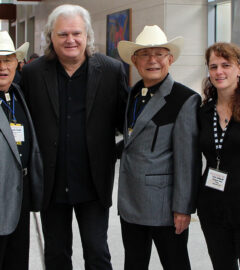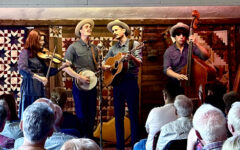
Bluegrass Police at Rocky Top in Tokyo – photo by Naomi Gingold for WUNC
It may seem odd to imagine, but bluegrass is big in Japan. Then again, it’s not all that surprising considering the fact that country music has always been popular in the Far East, and Japan in particular. It may seem like a paradox, but ask that nation’s musicians and they’re able to explain it easily.
In the documentary Far Western, a film that explores this unlikely cultural connection, Charlie Nagatani, the owner of a well known honkytonk which caters to a country music crowd is asked how he and his countrymen reconcile the love of a style of music that was birthed in a nation responsible for the worst devastation ever wrought when a pair of atomic bombs were dropped on two of their biggest cities.
The film shares their feelings then and now, which in a major way has to do with healing. World War II left lasting wounds, but it was music that allowed the bitterness to subside
These days, the Grassicana scene flourishes, and some bands, like the venerable Bluegrass 45 in particular, have actually gained a foothold of popularity here in the States. Others, like Bluegrass Police and the Nakashima Family Band, aren’t known at all in America, but have attracted a devoted following at home.
For Tatsuya Kuwahara, leader of the Bluegrass Police, the transition didn’t necessarily come naturally. He played guitar and drums in rock and roll bands before discovering the banjo at the age of 7. It was through an introduction to the music of Bob Dylan that he eventually took interest in a far rootsier regimen.
“No one around me was interested in bluegrass,” Kuwahara told Ben Luschen of the Oklahoma Gazette in a June 2017 interview. “My friends didn’t listen to it. My family didn’t know anything about it.” Today, however, he and his band are an essential part of what’s widely considered the second most popular place for bluegrass in the entire world. Much of that scene is based around a club called Rocky Top, a place that’s served up those sounds for nearly 40 years.
The Gazette article also included a mention of brothers Yasushi and Hisashi Ozaki, founders of what is widely considered Japan’s original bluegrass outfit, founded some 50 years ago. They first heard those archival sounds from a recording of She’ll Be Coming ‘Round The Mountain that their father brought home after a business trip in America. They then began listening to local Armed Forces radio and soon after, started fashioning their own makeshift homemade instruments. Eventually they were considered good enough to play at American army bases for local GIs.
Remarkably enough, most Japanese bands could pass for the real deal. Sample any of the YouTube clips featuring Japanese musicians playing old time standards and it becomes apparent pretty quickly that the majority of them are as good as their American cousins, especially when it comes to keeping an authentic attitude and ensuring reverence for the tradition. In listening to their singing and playing, one would find it impossible to define or determine their origins other than to suggest they were birthed in the American heartland.
These days, bluegrass is undergoing a resurgence in the Land of the Rising Sun, and just as jazz and rock found their own devotees, it seems to be regaining a specific niche of its own. While their traditions may be different and the two cultures might diverge, there’s a singular sentiment that breaks down barriers and makes any other divide seem superficial. Watching these artists perform songs like Nobody’s Business, Rocky Top, Texas Bluebonnet, and We’ll Meet Again Sweetheart allows them to share the same sentiment with clear conviction. Indeed, when these sounds are conveyed by a band like Bluegrass 45, the playing and presentation belie any distinct differences in devotion.








